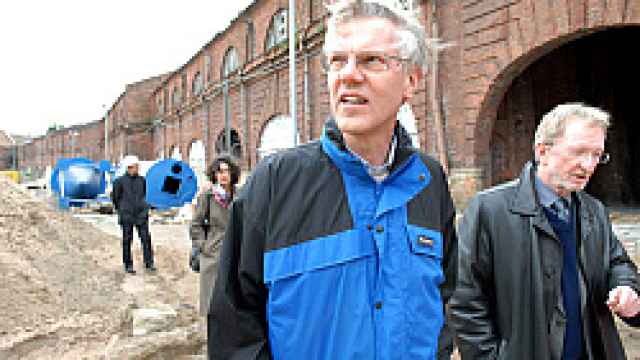Founded by a decree of Peter the Great in 1721, New Holland was used for drying timber for the city's shipbuilding industry. The 7.5-hectare artificial island was later a closed military site and was ultimately handed over to St. Petersburg by the Defense Ministry in 2004.
Now the city has undertaken a major redevelopment of the area, which will see historical 18th- and 19th-century buildings preserved and adapted alongside the creation of a modern multifunctional center designed by British architect Lord Norman Foster.
The developer gave a tour to a delegation of VIPs, including David Lewis, lord mayor of the City of London, and William Elliott, British consul-general in St. Petersburg, on Sept. 13 to show how the project was progressing.
"We feel that the guests from Great Britain want to share the atmosphere of being part of this project, which is being realized by the British architect Lord Norman Foster," said Tatyana Protasova, executive assistant to the senior project manager.
Foster's winning proposal was part of a bid by ST Novaya Gollandiya, which promised to invest $319 million into the project and complete construction by 2010.
Two other companies, NHI Group and Stroi Holding, competed for the high-profile contract.
Shalva Chigirinsky, the developer behind ST Novaya Gollandiya, said the company would finance 30 percent of the project's costs, with the rest to be borrowed from various sources, Interfax reported.
But earlier this month, the developers requested an extension of the deadline to 2012, citing the complexity of geological and hydrological explorations and the condition of the power network and other infrastructure on the island.
 Alexander Belenky / MT David Lewis, center, touring the New Holland site with Gregory Ingleright. | |
"We have to treat the historic buildings with care, and any acceleration in renovation may damage the island's infrastructure," said Georgy Yazikov, head of City Hall's committee for investments and strategic projects.
Investment is now expected to reach $800 million because of the high costs of carrying out underground construction, along with higher inflation and the falling dollar, said Gregory Ingleright, consultant for the New Holland project, who led the guests' tour.
"The heart of the project ?€” the brand new Palace of Festivals ?€” is designed to combine a 2,000-seat concert hall with art galleries and exhibition areas," Ingleright said. "It will be a spacious multifunctional structure with an amphitheater incorporating the island's internal lake. ?€¦ A floating stage will be available in the summertime, while during the winter months the lake will be transformed into an ice-skating rink."
When finished, the center will include cultural and exhibition facilities, luxury hotels, offices, serviced apartments, underground parking, retail outlets and entertainment areas.
The new buildings of the New Holland project have been designed with flexibility in mind. Five new bridges will unite the island with the surrounding neighborhood, and together with two existing bridges, the development hopes to accomplish the project's main goal: the integration of New Holland into St. Petersburg after nearly three centuries as a military facility.
Experts estimate that commercial exploitation of the island could provide an annual turnover of up to $100 million to the managing company, while the payback period after the project's completion will be six to seven years.
A Message from The Moscow Times:
Dear readers,
We are facing unprecedented challenges. Russia's Prosecutor General's Office has designated The Moscow Times as an "undesirable" organization, criminalizing our work and putting our staff at risk of prosecution. This follows our earlier unjust labeling as a "foreign agent."
These actions are direct attempts to silence independent journalism in Russia. The authorities claim our work "discredits the decisions of the Russian leadership." We see things differently: we strive to provide accurate, unbiased reporting on Russia.
We, the journalists of The Moscow Times, refuse to be silenced. But to continue our work, we need your help.
Your support, no matter how small, makes a world of difference. If you can, please support us monthly starting from just $2. It's quick to set up, and every contribution makes a significant impact.
By supporting The Moscow Times, you're defending open, independent journalism in the face of repression. Thank you for standing with us.
Remind me later.


